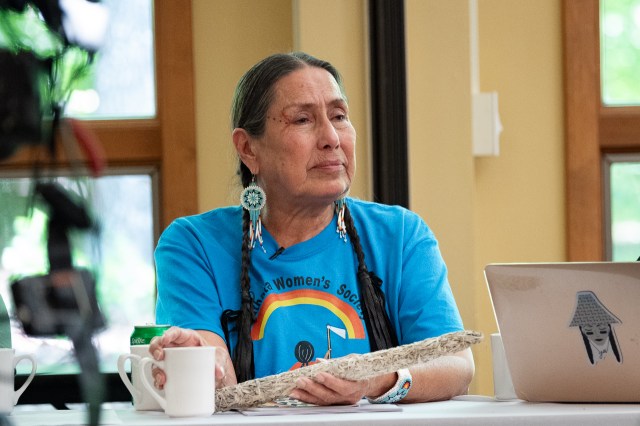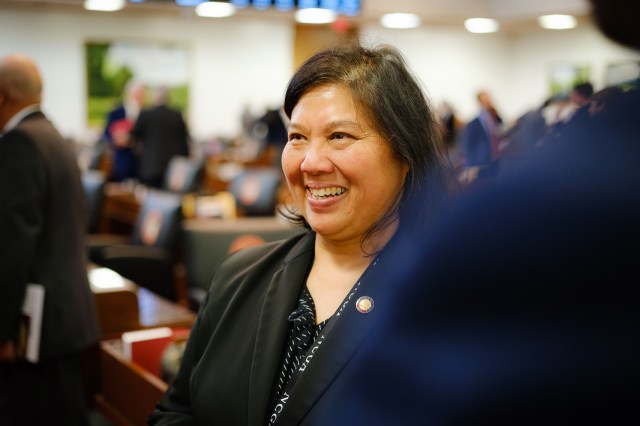Stay ahead of the curve as a political insider with deep policy analysis, daily briefings and policy-shaping tools.
Request a DemoGlobal ‘Rights of Nature’ movement touches down in NC

A child plays in the Haw River below the Granite Mill site in the Alamance County community of Haw River on June 9, 2024. (Credit: Clifton Dowell)
- An indigenous-led “tribunal” considered the threats a pipeline project poses to the Haw River
- North Carolina bills would grant legal rights to the Haw and Dan river ecosystems
- Environmentally concerned legislators across U.S. consider green-amendment approach
Two bills introducing a novel legal concept have landed with a thud in the House Rules Committee, but supporters believe the idea might someday provide a better foundation for environmental law in the United States.
House Bills 795 and 923 fall within a larger international movement known as Rights of Nature and would essentially give the Haw and Dan river ecosystems the legal right to be healthy, clean and free of man-made obstructions. Not even bill sponsor Rep. Pricey Harrison, D-Guilford, thinks the legislation stands a chance of passing, but environmentalists around the globe believe the core concept — nature as a rights-bearing entity — is gaining traction.
“Western law is very linear,” said Crystal Cavalier-Keck, an Alamance County activist and member of the Occaneechi Band of the Saponi Nation. “In nature, our laws are very circular. I’m just trying to educate people in this community, especially our Indigenous people, who have forgotten their original instruction.”

Cavalier-Keck is a co-founder of 7 Directions of Service, which describes itself as an Indigenous-led environmental movement to protect the Occaneechi-Saponi homelands in rural North Carolina, especially the Haw River ecosystem.
The group staged a “people’s tribunal” earlier this month to hear testimony about the threat to the Haw River ecosystem posed by the Mountain Valley Pipeline (MVP), an underground natural gas pipeline. The project’s plans have at times included a section running from the Virginia border southeast through Rockingham and Alamance counties before terminating near Graham.
During the tribunal at Haw River State Park in Browns Summit, a panel of judges from around the country heard testimony on the harms the MVP project could inflict on the Haw River and the people who live near it. Representatives of the pipeline and the North Carolina Department of Environmental Quality declined invitations to attend, organizers said.

The idea that a panel of Indigenous judges might issue a ruling on a pipeline project outside of normal governmental permitting processes is based on the premise that the rights of nature already exist.
“I think if we’re looking at where we are in this journey for the United States in recognizing rights of nature, we look back at past movements for rights — whether we’re talking about slavery, civil rights, women’s rights — those rights always already existed,” Shannon Biggs, co-founder of the San Francisco-based Movement Rights, said. “And then what we’re doing is asking the law to catch up to what is real and what is right and what is ethical and what is just.”
Currently in the U.S., any individual suing over damage to a natural resource or pollution to an ecosystem must demonstrate legal standing — that he or she has personally been or will be harmed — not simply that damage or pollution has occurred.

It is this question of legal standing, enshrined in Article III of the U.S. Constitution, that has proven the biggest challenge to successfully bringing federal lawsuits, Georgetown University Law Professor Hope M. Babcock wrote in a 2016 paper published in Ecology Law Quarterly.
Lawyers, she wrote, have to argue an “almost fictive connection” between the injured party and the threatened resource. If the resource had the right to complain, she wrote, “the injury prong of Article III standing should cease to be a problem.”
Babcock, who has been involved in environmental law since the 1970s, said in a 2022 interview that the Rights of Nature concept has proven to be a tough sell in the U.S., where the courts have been willing to bestow nonperson rights on corporations but not on natural resources.
“The idea that a tree could go to court and demonstrate it has been injured has been a nonstarter for a lot of folks,” she said.
Another practical criticism of Rights of Nature legislation is that it would open a floodgate of litigation because any person could sue on behalf of any damaged resource, leading to chaos in the courts.

Ecuadorian environmentalist Natalia Greene, who traveled to Browns Summit from a country that added the rights of nature to its constitution in 2008, said treating nature as a resource to be exploited is chaotic.
“I feel that those people that are saying this is all going to go out of control are the people that are very keen on keeping the system, the destruction,” she said. “On the contrary, we are in the conundrum right now. It is a chaos right now because we are in a system that treats nature as an object and not the subject of rights.”
Greene is a director at Global Alliance for the Rights of Nature and the secretary of the International Rights of Nature Tribunal — both sponsors of the Haw River tribunal, which was streamed in English and Spanish and captured by a video team that said it would create a documentary film about the event.

Harrison, the bill sponsor, said she liked that the Rights of Nature movement is grounded locally in the Indigenous community. The issue of Haw River population is local to her as well. “Greensboro is right next door, so we’re contributing to the water-quality problems in the Haw River,” she said.
Asked why she filed the bills if they had little chance of passing, she chuckled. “It wouldn’t be the first time. Almost everything I file, I don’t expect to be taken up. But it’s the right thing to do.”
Harrison said that national groups of environmentally concerned legislators have been discussing the idea of green amendments to state constitutions and that the Rights of Nature approach appeared to be a good fit. “The reason why it’s a good idea is because it seems to provide more protection for these areas than just simple patches of environmental regulations,” she said.

Another provision of the Rights of Nature movement that appeals to Harrison is removing the legal hurdle of proving standing in court cases. A direct causal link between disease and pollution can be hard to prove but is otherwise pretty clear.
“You know the water quality isn’t what it was before, that there’s something bad about it that’s causing you to be sick,” she said. “So, yeah, I like the movement and I’d like it to get some traction. It may happen in a bluer state.”
Meanwhile, in a decidedly red legislature, Harrison said the best result she hopes for would be a committee hearing where the topic might be discussed. But even if that doesn’t happen, the idea may stick around.
“I have been here a long time — 20 years — and some of these bills have taken 20 years to pass,” Harrison said. “You just introduce it time after time and people start to get used to the idea.”
For questions or comments, or to pass along Insider Weekender ideas, please write to Clifton Dowell at [email protected] or @StateAffairsNC on X.
Know the most important news affecting North-carolina
Get our free weekly newsletter that covers government, policy and politics that impact your everyday life—in 5 minutes or less.
Mending the divide: Institute shapes future North Carolina leaders
A Confederate monument in Alamance County was dividing the community in half, sparking a war of words and strong emotions over the question of whether the statue was preserving history or honoring hate. At the time, Amy Galey, chair of the Alamance County Commission, called up an old friend for advice, hoping he might help …
Insider Afternoon Update for June 6, 2024
The conference report on the so-called “mask ban bill” sailed through the Senate without opposition Thursday, but only because every Democrat was absent from the chamber when the vote took place. The conference report adds an exemption for people who need to wear masks for medical reasons, but also makes a change to campaign financing law that …
AKC visits NC legislature with dogs, treats
When it comes to lobbying, likability never hurts, so some groups have a natural advantage. “I don’t think I have ever met an anti-dog legislator,” said Sheila Goffe, vice president, government relations, at the American Kennel Club. The group was set up on Halifax Mall Wednesday with baskets of treats — both canine and human — …
NC House pauses to honor speaker’s father
The North Carolina House of Representatives took a pause Tuesday as meetings for the week were canceled and members and staffers prepared to head west to Kings Mountain to attend the funeral of the father of House Speaker Tim Moore. The entire legislative schedule for Wednesday has been cleared. The House canceled the following meetings: …




